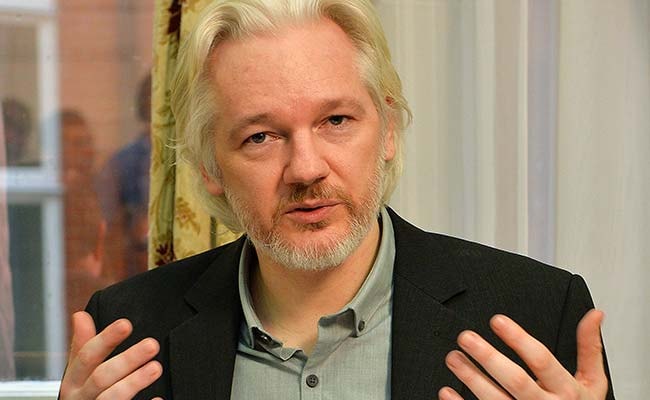
File photo of WikiLeaks founder Julian Assange.
Paris:
WikiLeaks founder Julian Assange claimed in an interview published Friday that President Francois Hollande "stabbed me in the back" by rejecting his request for asylum in France.
The head of the whistleblowing website told Society magazine that France's rejection of his request in July followed discussions at the highest levels.
"There had been direct contact between Francois Hollande and me. Text messages were exchanged through my French legal advisor. The French president gave encouraging signs," Assange said, in comments translated from French.
"In a way, his (final) response was a stab in the back," Assange said.
"What pushed him to change his mind between the first exchanges and his final public response?" Assange asked.
He said: "Perhaps he wanted to look strong, not to the French, but to the United States and the United Kingdom, to be loyal to them.
Publicly rejecting such a request was a way of doing that."
Assange has been holed up in the Ecuador embassy in London since 2012, having taken refuge there because Sweden wanted him to be extradited to answer questions about an allegation of rape. He insists Sweden wants to pass him on to US authorities over the release of hundreds of thousands of classified cables.
In turning down his asylum request, Hollande's office had said Assange's situation "does not present an immediate danger".
It added: "Furthermore, he is subject to a European arrest warrant."
The French presidency had no comment on Assange's claims on Friday.
Swedish officials said last month they hope to reach a judicial cooperation deal with Ecuador by the end of the year that would clear the way for Swedish prosecutors to question Assange.
The head of the whistleblowing website told Society magazine that France's rejection of his request in July followed discussions at the highest levels.
"There had been direct contact between Francois Hollande and me. Text messages were exchanged through my French legal advisor. The French president gave encouraging signs," Assange said, in comments translated from French.
"In a way, his (final) response was a stab in the back," Assange said.
"What pushed him to change his mind between the first exchanges and his final public response?" Assange asked.
He said: "Perhaps he wanted to look strong, not to the French, but to the United States and the United Kingdom, to be loyal to them.
Publicly rejecting such a request was a way of doing that."
Assange has been holed up in the Ecuador embassy in London since 2012, having taken refuge there because Sweden wanted him to be extradited to answer questions about an allegation of rape. He insists Sweden wants to pass him on to US authorities over the release of hundreds of thousands of classified cables.
In turning down his asylum request, Hollande's office had said Assange's situation "does not present an immediate danger".
It added: "Furthermore, he is subject to a European arrest warrant."
The French presidency had no comment on Assange's claims on Friday.
Swedish officials said last month they hope to reach a judicial cooperation deal with Ecuador by the end of the year that would clear the way for Swedish prosecutors to question Assange.
Track Latest News Live on NDTV.com and get news updates from India and around the world

